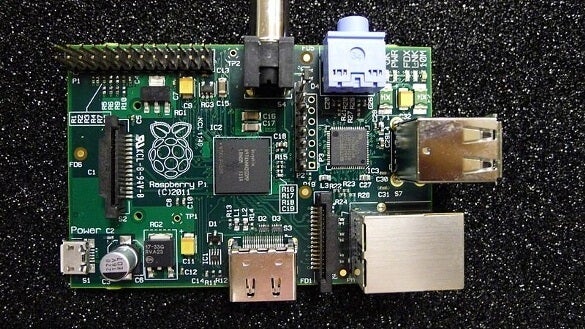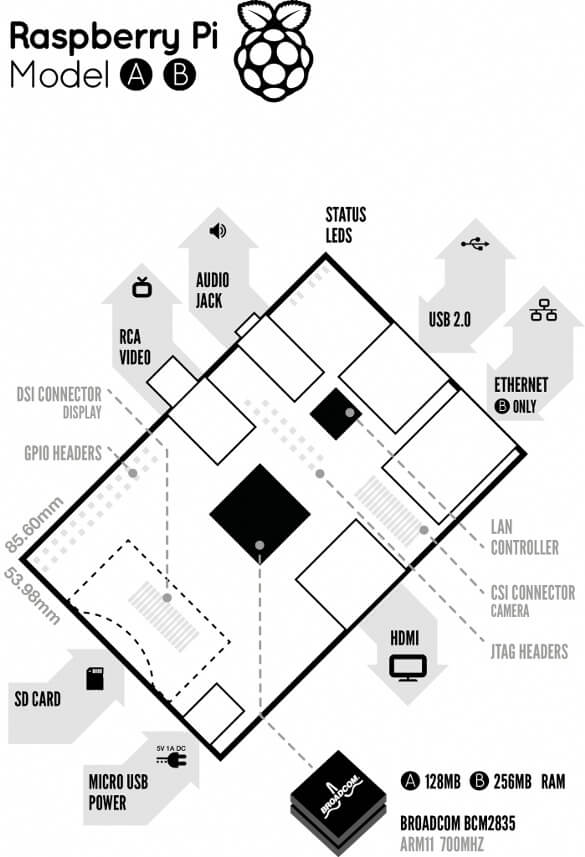
What do you feel like doing, going out for dinner or buying a computer? The computer’s probably cheaper. In a joyful moment for the the charity, the Raspberry Pi Foundation announced that as of “a couple of days” before January 10th, production has begun on their $35 Linux computer. The Raspberry Pi Model B is an ARM GNU/Linux Box with 256 MB memory, 700 MHz processing, HDMI port, and Blu-Ray video quality capabilities. According to the post by foundation spokesperson Liz Upton 10,000 of the Model B computers will be fully constructed in a manner of weeks. As stripped down as a computer can probably be, the Raspberry Pi Model B is little more than a circuit board that fits in the palm of the hand. Yet that tiny bare bones board holds the promise of cheap computing for all.
The Raspberry Pi will probably be arriving in the foundation’s hands sometime in February, which means that it may take a few weeks there after before the first 10,000 of these ultra cheap computers are in the hands of users. Still, that’s sooner than the foundation had planned, and years ahead of when detractors thought the device would arrive (that being never, or upon snowfall in Hell). At just $35, the Raspberry Pi Model B is still a very capable device, with an ARM 11 700MHz processor, 256 MB memory, USB 2.0 port, ethernet port, and an HDMI video out. The entire board is uncovered, weighs only 45 grams, and is powered via a 5 volt micro USB power supply (reportedly it can run quite well off of four AA batteries). While outclassed by most modern smart phones, the Raspberry Pi is available at just one-tenth the cost (or one-twentieth, depending) and it still plays a mean game of Quake III. (Check out the graphics demonstration video below!)
In order to get the Model B produced quick enough, cheap enough, and in the right quantity, the Raspberry Pi Foundation had to scrap its hope to perform the manufacturing in the UK. Instead, the Model B is being made in “Far East Asia”. The Model A, which will sell for $25 but lack the ethernet port and have half the memory, is set to arrive later this year and will be entirely made in the UK.

Whether it’s for $35 or $25, who exactly is going to be buying a tiny computer on a circuit board? The entire concept behind Raspberry Pi is that it can serve as an entry-level build for would-be code hackers and programmers. Founder Eben Upton conceived of the idea while at Cambridge University in 2006, noticing that incoming students were more familiar with web design than raw programming skills, and many had much less experience than applicants from even just a decade earlier. Where were the students with years of experience just messing around with computers?
The theory goes that most family computers are large investments for the home, with uses that center around media, and web browsing. Gone are the days when parents can simply let their kids tinker around on the computer, and even if they did allow it, manufacturers aren’t exactly producing builds that are easy to open and understand. The Raspberry Pi Foundation wants to create a computer that any parent can buy for a child (or a child can buy for themselves) and feel comfortable with experimenting. As the Model B (and later Model A) can work with different external screens, power supplies, etc, the student should be able to program their Linux Box at home, unplug it, take it to school or a friend’s house, and plug right back in to keep the learning going. Setup as a charity, the Raspberry Pi Foundation will also be poised to offer their cheap computers to thousands of low-income students in the UK and eventually around the world. Already there’s been discussion of buy one-give one style purchasing options so that enthusiasts can receive a Model B while helping someone less fortunate grab a slice of the Raspberry Pi.
Just a few years ago a $35 computer that fits in your palm and can handle Blu-Ray graphics would have seemed ludicrous. Yet the Raspberry Pi Model B is arriving in a world where low-end computing has become one of the most exciting sectors of the market. For about the same cost as the Model B, India is offering a touchscreen tablet computer to its students. Sub-saharan Africa has Chinese-built Android smart phones for around $80, and a thriving app market to go with it. Sure the iPhone 4s or Galaxy Nexus each have twice the processing power and four times the memory, but computers like the Raspberry Pi also have a chance to change the world. When almost everyone can afford something, it becomes a standard that elevates entire industries. Raspberry Pi is helping build the next generation of programmers in the UK, and they are just one of many institutions, both for and not-for profit, that will shape humanity’s future by making poverty no bar to computing.
[image credit: Liz Upton, Raspberry Pi Foundation]
[source: Raspberry Pi Foundation]



